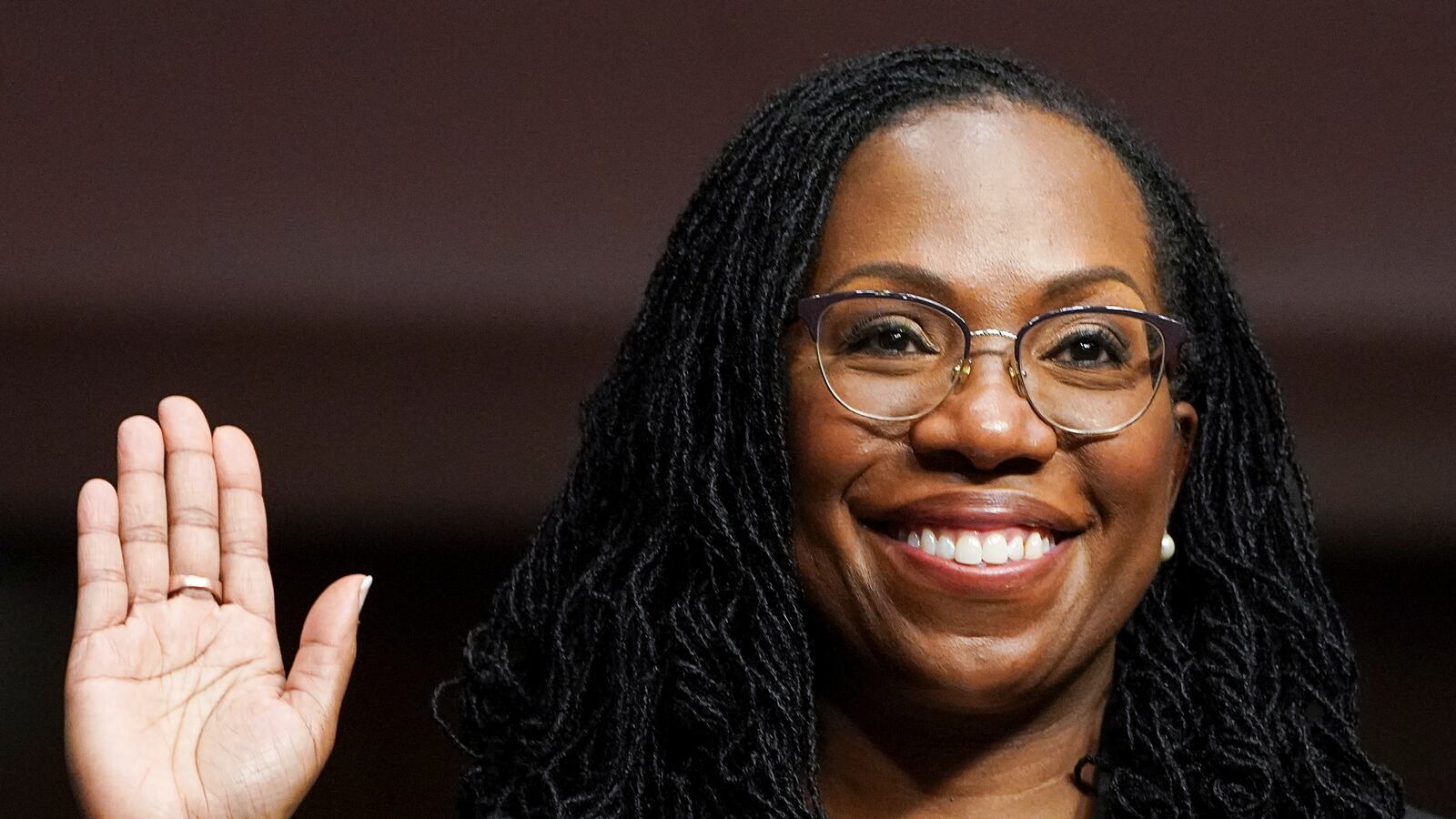In February 2020, struggling presidential candidate Joe Biden made a pledge to voters that he would name the first Black woman to the nation’s highest court.
“I’m looking forward to making sure there’s a Black woman on the Supreme Court,” Biden said during a presidential debate. “I am loyal—I do what I say.”
Two years later, nearly to the date, Biden fulfilled that promise with the selection of Judge Ketanji Brown Jackson as his nominee to replace outgoing Justice Stephen Breyer on the U.S. Supreme Court, a source familiar with the decision confirmed to The Daily Beast. The selection was first reported by CNN early Friday morning.
“It’s my honor to introduce to the country a daughter of former public school teachers, a proven consensus builder, an accomplished lawyer, a distinguished jurist on one of the nation’s most prestigious courts,” Biden said at a White House event announcing Jackson’s nomination for the seat on Friday. Jackson, Biden said, would “bring to the Supreme Court an independent mind, uncompromising integrity and a strong moral compass and the courage to stand up for what she thinks is right.”
Jackson, who currently holds Attorney General Merrick Garland’s former seat on the U.S. Court of Appeals for the District of Columbia, was long seen as the presumptive frontrunner for the seat. The 51-year-old Miami native’s résumé is studded with many of the accomplishments that court-watchers have come to expect from potential Supreme Court justices: two Harvard degrees, both with honors; three federal clerkships including one under Breyer himself; eight years as a district court judge after a unanimous Senate confirmation by voice vote in 2013.
But Jackson—whose confirmation would not alter the ideological makeup of a Supreme Court currently dominated by conservative justices—would also break the model of many more traditional nominees.

Ketanji Brown Jackson greets Sen. Chuck Grassley (R-IA), before a Senate Judiciary Committee hearing on pending judicial nominations on Capitol Hill in Washington in 2021.
ReutersA former assistant federal public defender, Jackson served as the vice chair of the United States Sentencing Commission under President Barack Obama, where she worked to reduce sentencing guidelines for crack cocaine offenses and reduced offense-levels for drug crimes. Jackson would also be the first justice since Thurgood Marshall to have worked in criminal defense—fulfilling a pledge Biden made to diversify the court system beyond former prosecutors—a fact that won widespread support for her potential nomination by civil rights groups and liberal legal organizations.
While her short tenure on the U.S. Court of Appeals has not left a lengthy paper trail of decisions, she did become a folk hero among left-leaning groups in a decision ruling against former President Donald Trump in his bid to block the release of White House records pertaining to the Jan. 6 attack on the U.S. Capitol, writing in part: “Presidents are not kings.”
Speaking after Biden, Jackson acknowledged the historic nature of her nomination at a moment when global democracy appears imperiled—and thanked Breyer, the justice she once clerked for and now hopes to replace.
Breyer, she said, “not only gave me the greatest job that any young lawyer could ever hope to have, but he also exemplified every day in every way that a Supreme Court justice can perform at the highest level of skill and integrity, while also being guided by civility, grace, pragmatism and generosity of spirit.”
“Justice Breyer, the members of the Senate will decide if I fill your seat,” Jackson said. “Please know that I could never fill your shoes.”
The fate of Jackson’s nomination in the narrowly Democratic Senate is not so clear as her confirmation by acclamation to the U.S. District Court, however. Her nomination to the U.S. Court of Appeals last year was a hard-fought victory as numerous Republican senators who had backed her previous nomination voted against her—in part, some admitted at the time, because she was seen as a likely future Supreme Court nominee. In the end, just three Republicans, Sens. Lindsey Graham (SC), Lisa Murkowski (AK) and Susan Collins (ME) voted with Democrats to confirm her.
“I know very well what my obligations are, what my duties are,” Jackson told Sen. Thom Tillis (R-N.C.) when he noted her inclusion on a wish list of potential Supreme Court nominees compiled by the liberal group Demand Justice. “Not to rule with partisan advantage in mind, not to tailor or craft my decisions in order to try to gain influence or do anything of the sort.”





